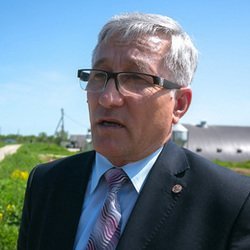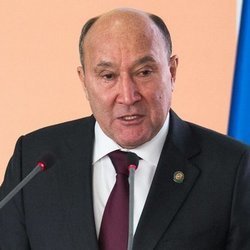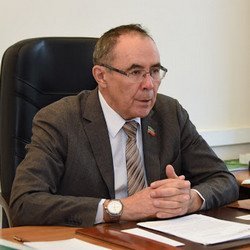"100k ha being sown in recent days”: farmers of Tatarstan hope for a profitable year
The sowing campaign in the republic is is entering the final stretch
In Tatarstan, COVID-19 has not affected the sowing campaign, which is to be completed by the end of this week. At the moment, almost 1,3 million hectares, or 73% of the area, are sown, according to the ministry of agriculture and food of the Republic of Tatarstan. Not to remain in the red, farmers are planting spelt and other promising grains that are now projected to be in price. Judging by the current conditions, we should expect a rich harvest. Of course, if it can be gathered without loss.
Spelt instead of sugar beet
This year, according to the ministry of agriculture and food of the Republic of Tatarstan, the acreage in the republic, compared to last year, has not changed and is 2,8 million hectares. But because of last year's overproduction crisis, when all those who were engaged in growing and processing sugar beets went into a deep minus, it was decided to reduce its crops by an average of 24 per cent. According to Chairman of the Association of Farmers Kamiyar Baytemirov, some producers went even further, reducing the area for this crop by 50% or more, replacing it with cereals, which, according to forecasts, will be in price.

In general, the “menu” of crops in the republic looks like this: cereals and legumes occupy 1,5 million hectares, including winter cereals — 493,000 hectares; spring crops — more than 1 million hectares; sugar beet — 49,100 hectares; rapeseed — 96,600 hectares; potatoes and vegetables — 6,600 hectares; corn (including forage one) — 187,000 hectares; sunflower — 126,600 hectares; forage crops — 888,58 thousand hectares.
As explained by Deputy Chairman of Tatarstan State Council, ex-Minister of Agriculture and Food Marat Akhmetov, the republic prefer reliable “classic suitable for our climatic zone”.
“We can't grow bananas... There is no need to invent a bicycle here. Taking into account the droughts that have occurred in the past 10 years, we have started to grow corn for grain and increased the area of sunflower, although these are quite risky crops. But technologically they took place, especially in the Trans-Kama Region and Volga Region, where they are given significant areas and they are successfully engaged in.
Coronavirus is not a hindrance
At the moment, the sowing campaign in Tatarstan is nearing completion — 73% of the area, or almost 1,3 million hectares of arable land, has been sown. Interestingly, the COVID-19 pandemic has not made any adjustments to the spring field work.
“The coronavirus has neither restrained the sowing campaign itself nor affected the quality of work. Everything was prepared already in the first quarter of this year, so everything was organized, or rather, we are conducting it in an organized manner — the sowing campaign has not finished yet. There are crops of early and late sowing, so everything is on schedule," Kamiyar Baytemirov said.
His words were confirmed by the chief agronomist of the Department of Agriculture and Food in the Arsky District, Rail Shakirzyanov:
“The coronavirus has not affected us in any way — the work hasn't been suspended, people will need to be fed when this is all over. All safety measures — gloves, masks, so that there is no mass congestion of people — are being observed.”
Former Minister of Agriculture and Food of the Republic of Tatarstan Marat Akhmetov also noted the good organization of the ongoing campaign.
“Now it is very organized, 100,000 hectares have been sown in recent days. I think that on May 15-16, most districts will complete the sowing campaign. This does not mean that works are over on this, in the course of sowing campaign, there is also winter crop tending, then crop protection, additional plant nutrition, their tending. The work is rich, consistent, and systematic. Interestingly, the fields have matured very nicely. We used to have one part of the field maturing, and the other — not yet, and then we have to go back. This year, we have the opportunity to work productively — in terms of tillage, moisture closing, sowing itself and crop tending.
Breakthrough of ministry of agriculture and food
Deputy Chairman of the Committee on Ecology, Nature Management, Agro-Industrial and Food Policy of the State Council of the Republic of Tatarstan Takhir Khadeev highlighted the main thing that characterizes the current situation in agriculture — a high level of protective work, which had not been before. And what the harvest will be depends on this.
“Although the sowing campaign is a little late, foliar application, chemical protection from pests and other works are ahead of schedule by three to four times compared to previous periods. This is the first time this has happened, and these are very good indicators. The ministry of agriculture of the Republic of Tatarstan has been consistently working towards this goal for the last 7-8 years. The most difficult thing is to change human thinking. When you change the thinking — you change the action, and here the psychological barrier has been overcome. Previously, it was the following way: mostly only in August we were already approaching harvesting. Now, I believe that 70 per cent of farms are competent not only for sowing, which is 12-15 per cent of the work on growing crops, but also for the entire range of work, including pest control and plant diseases. I like the approach of a number of farms that competently use new soil protection technologies.
Khadeev noted that the villagers did a very good job, but after sowing, an equally important stage begins — crop formation, which includes integrated protective measures and nutrition.
“The correct organization of work is important here. Technological processes should be under daily control. We need to carry out this work without leaving it for tomorrow," he stressed.
State support for 2,2 billion rubles
An important role in the effectiveness of spring field work is played by the monetary component. According to Marat Akhmetov, farmers have managed to accumulate “fat” over the winter.

According to the ministry of agriculture and food of the Republic of Tatarstan, subsidies to rural workers amounted to more than 2,2 billion rubles. Out of these, 600 million rubles, including from the federal budget, have been allocated for the development of production of vegetables, potatoes, industrial hemp and fibre flax, and 607 million rubles for cereals and legumes. Of these, agricultural producers received 456 million rubles under the first article and 355 million rubles — under the second. Another 1 billion rubles was received for the purchase of mineral fertilizers.
Crop forecasts are positive
Realnoe Vremya experts note that the current conditions give the opportunity to make plans for a good harvest.
“The winter crops have wintered very well, and they have been fed on time. Spring was soft for them, so they passed all the necessary phases in a favoгrable regime for crops. I think the harvest will be very good, if, of course, there is no drought. For spring crops, too, so far everything is going well. There was a lot of precipitation, it was warm, so everything is rising quickly. If there are rains and there is no heat, it should be a good year," Rail Shakirzyanov gives his forecast.
The former minister of agriculture also agrees with him. “The advantages of this year are good water availability, winter crops have overwintered well, and this is a serious basis for a high yield. If the weather is favourable in the summer, we will have a very serious reserve for winter crops," Akhmetov said.
Takhir Khadeev noted the generally positive weather conditions that have developed this year, with the exception of the Nurlat district.

In his opinion, due to problems with moisture in the south of Russia, grain will be in price. And those who grow it should be in profit. If, of course, there are no large losses during the harvest. And this is the weak point of our farmers, according to the deputy chairman of the committee of the State Council of the Republic of Tatarstan.
“We live and work in the Northern regions. In Stavropol, Krasnodar, it is possible to gather winter crops in 7-9 days. This is extremely fast. Moreover, they have beautiful weather, it does not rain at this time. And our harvesting campaign lasts for 40-60 days. Therefore, we need to seriously prepare for the harvesting campaign already today.